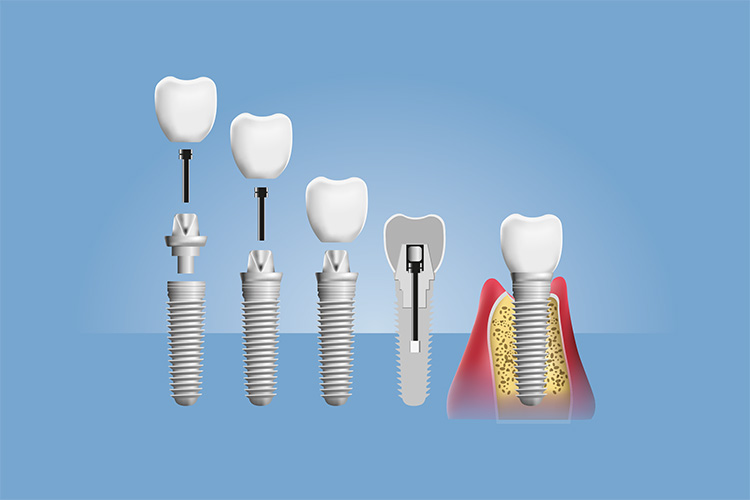
Implantology
Dental implants are designed to replace the roots of missing teeth, onto which “new teeth” are subsequently placed – single crowns, bridge constructions, block crowns, or special abutments that are capable of retaining implant-supported prosthetic constructions (special dentures).
Implants provide the opportunity to replace a single tooth or a large group of missing teeth, while protecting the bone from afunctional resorption – loss of volume – thanks to the functional load applied to it as a result of the chewing process.
A minimum of two implants can stabilize a removable denture, making it secure and comfortable.
The Implantation Procedure:
Dental implants are placed after a thorough clinical examination and necessary paraclinical tests, including 3D imaging and clinical-laboratory analyses.
If the results confirm suitability for dental implantation, a date for the procedure is scheduled. Typically, the placement of a dental implant takes less than an hour and is performed under local anesthesia in a dental office specifically prepared for implantation.
Assistance, which is also of critical importance, is provided by a colleague who is also a periodontologist. Additionally, we have both sterile and non-sterile nursing staff dedicated to ensuring the patient’s comfort throughout the procedure.
The implantation usually concludes with suturing of the gingiva, with stitches being removed between the 7th and 14th day. Patients may experience mild discomfort in the first 48 hours after implantation, such as slight swelling or moderate pain.
We provide detailed post-operative instructions and prescribe medications if necessary.
After the implantation procedure, an X-ray is taken in the office, and the patient is provided with a special implant passport.
This passport includes the unique serial number of the titanium implant and is signed by the implantologist.
We work with Osstem, ETK, and MIS dental implants.
When it is necessary to place multiple implants, we can make preliminary surgical and prosthetic guides to facilitate and refine the procedure. When possible, we always prepare temporary prosthetic solutions for the patient so that they do not have to be without teeth for a long time.
Patient Selection:
When offering dental implant treatment, it is essential to have complete and up-to-date information about the patient’s overall health. Implants are placed only in a sanitized oral environment—meaning any existing dental or periodontal issues must first be addressed and treated. This step minimizes the risk of complications and reduces the chances of implant failure over time.
Patients are informed in advance and required to sign a consent form acknowledging that to ensure the longevity of the implant-supported restorations, they must commit to regular follow-up check-ups, professional plaque and tartar cleaning, and maintaining excellent personal oral hygiene.
Implant Failure:
Implant failure is typically related to the inability of the implant to osseointegrate with the bone, which leads to early implant loss. This is usually not associated with acute pain symptoms. In the first 1-3 weeks, there may be mild swelling and redness around the implanted area, possibly accompanied by slight discomfort.
It may be due to a lack of good primary stability, infection, or surgical trauma.
In such a case, if the implant does not fall out spontaneously, it is removed under local anesthesia. The site is then allowed to heal, and if there are indications, the implant may be placed again.
Our patients are informed that:
- Patients are informed that failures occur more frequently in smokers, both with dental implants and periodontal surgeries.
- Patients who do not maintain regular and thorough oral hygiene and miss their preventive appointments have a higher risk of developing problems around their implants and teeth.
Patients who are at higher risk include:
- Patients with uncontrolled diabetes;
- Patients who abuse alcohol or drugs;
- Patients who are undergoing immunosuppressive therapy, such as corticosteroid treatment,
- Patients who suffer from diseases that affect bone metabolism, such as osteoporosis or other bone disorders;
- Chronic vitamin D deficiency;
- Active smokers;
- Patients who have undergone bisphosphonate therapy (typically for the treatment of osteoporosis);
- Patients who do not strictly follow the post-operative instructions;
- Suffering from bruxism or bruxomania;
- others
If early implant failure occurs, the manufacturer and we fully guarantee it, providing a new implant completely free of charge or refunding the money paid for the procedure.
Late implant failure occurs after the implant has already osteointegrated, been loaded with the corresponding prosthetic structure, and functioned in the oral cavity. It can be caused by overloading the implant, infection, bone loss, radiotherapy, or mechanical complications. In patients with a history of periodontal disease, the risk of implant failure is higher. Therefore, maintenance visits for periodontal patients are absolutely mandatory.

We work with NHIF, Fi-Health, Unica.
Testimonials

Anna Kostova
- Patient

Maggie Petrova
- Patient

Radost Yanakieva
- Patient

Kamelia Pavlova
- Patient

Karina Stoycheva
- Patient

Dimitar Zlatanov
- Patient

Ellie Boteva
- Patient

Fil Zen
- Patient

Elina Vardeva
- Patient

X
- Patient

Svetoslav Ivanov
- Patient

